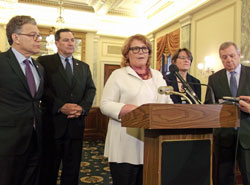 Hanwha SolarOne Co., Ltd., a global photovoltaic manufacturer of high-quality, cost-competitive solar modules, announced it has completed the installation of 31 MW in a EPC commercial rooftop project in Guangdong Province, China.
Hanwha SolarOne Co., Ltd., a global photovoltaic manufacturer of high-quality, cost-competitive solar modules, announced it has completed the installation of 31 MW in a EPC commercial rooftop project in Guangdong Province, China.- The Nuview Union School District has launched a comprehensive sustainability project that includes solar energy systems, energy efficiency measures and improved lighting components that are guaranteed to save the district over $7 million in its first 20 years of operation. Chevron Energy Solutions designed and built the project that includes solar generation capacity at three district locations, upgraded HVAC systems, and energy-saving LED lighting. In total, the project is expected to reduce the district’s utility-purchased electricity costs by approximately 85 percent. Chevron’s work with Nuview will also include hands-on labs to engage students in developing science, technology, engineering and math (STEM) skills.
- Ecoppia, a developer of autonomous water-free photovoltaic solar panel cleaning solutions, announced that its commercially-deployed E4 robotic cleaning system has now cleaned over one million panels. The autonomous energy-independent water-free E4 robots use a soft microfiber and controlled air flow cleaning system to remove 99% of dust daily, keeping panels at optimal production 24/7/365.
- Collins Bus Corporation has announced that it is accepting orders for its new compressed natural gas (CNG) model that provides an estimated 250-300 mile range, decreases greenhouse gas emissions by up to 15% and reduces operating costs. Built on a Ford E-450 6.8L cutaway chassis backed by a Ford Factory 5-year/60,000-mile engine and powertrain warranty, Collins’ CNG bus features the Westport WiNG™ Power System dedicated natural gas fuel system certified by the California Air Resources Board (CARB) and U.S. Environmental Protection Agency.
Biofuels Industry Urges VP Biden to Stand RFS Strong
The Iowa biofuels industry is asking United State Vice President Joe Biden to stand “RFS Strong”.
A recent Reuters article claimed that Vice President Biden played a major role in attempting to get the Obama administration to gut the Renewable Fuel Standard (RFS). The article detailed an exchange between Vice President Biden and Philadelphia Congressman Robert Brady,  who contacted Biden on behalf of the Carlyle Group, an alternative asset management firm which had previously purchased two oil refineries in Brady’s district that were struggling due to lower profit margins. Biden reportedly told Brady he could fix the issue.
who contacted Biden on behalf of the Carlyle Group, an alternative asset management firm which had previously purchased two oil refineries in Brady’s district that were struggling due to lower profit margins. Biden reportedly told Brady he could fix the issue.
“If accurate, this report would confirm our worst suspicions—that Vice President Biden and the Administration have done an about-face on their support for cleaner fuels, consumer choice and cutting oil dependence,” said Iowa Renewable Fuels Association (IRFA) Executive Director Monte Shaw. “Iowans and all Americans deserve to know where the Vice President stands on the RFS. Does he really want to walk away from the only federal policy allowing market access for renewable fuels in the face of a century of policy preferences for petroleum? Abandoning the RFS would result in less competition, less consumer fuel choice and higher fuel prices, while strengthening the oil industry’s near monopoly over the transportation fuel sector.”
If the claim is true, IRFA points out that the move to advocate for oil companies to the detriment of renewable fuels would represent a sharp break from Vice President Biden’s track record of supporting the RFS and decreasing America’s dependence on foreign oil. The alleged exchange would also be a departure from the Administration’s commitment to innovative American renewables and pursuit of energy independence, more American jobs, and a brighter climate future.
In response to the claims, IRFA joined dozens of biofuel and ag leaders in submitting a letter to VP Biden requesting a meeting and urging him to revisit the issues he has around the RFS. The Environmental Protection Agency (EPA) is rumored to be releasing its final 2014 renewable fuel volumes (RVO) on or around June 1, 2014.
The letter reminds the Veep that he “campaigned in Iowa in 2007 and 2008 as a strong champion of the bipartisan, common sense Renewable Fuel Standard”. The authors urge: “Please do not be fooled by the crocodile tears coming from the oil industry, who claim to be concerned about rising gasoline prices. Their argument is preposterous on its face”.
In part, the letter reads: “This has already become a full-blown campaign issue in Iowa in 2014, and it will be a major issue for every candidate who visits Iowa in 2016. This is a crucial juncture for America’s renewable fuel industry, and we cannot allow the oil industry to dominate the debate or bully our political leaders into backtracking to greater foreign oil dependence.”
Ethanol on the Rails
 In the last couple of weeks there have been two derailments of trains carrying crude oil, one in Virginia on April 30 and one in Colorado on May 9. These incidents are just the latest in a string of accidents that began last summer when a runaway oil train carrying Bakken crude derailed and exploded in Lac-Megantic, Quebec, killing 47 people. Other trains carrying Bakken crude have derailed and caught fire in Alabama, North Dakota, and New Brunswick, Canada.
In the last couple of weeks there have been two derailments of trains carrying crude oil, one in Virginia on April 30 and one in Colorado on May 9. These incidents are just the latest in a string of accidents that began last summer when a runaway oil train carrying Bakken crude derailed and exploded in Lac-Megantic, Quebec, killing 47 people. Other trains carrying Bakken crude have derailed and caught fire in Alabama, North Dakota, and New Brunswick, Canada.
 While crude oil has been the common denominator in these accidents, ethanol has been caught in the cross fire despite its nearly perfect safety record in rail transportation.
While crude oil has been the common denominator in these accidents, ethanol has been caught in the cross fire despite its nearly perfect safety record in rail transportation.
In this edition of “The Ethanol Report,” Renewable Fuels Association (RFA) president and CEO Bob Dinneen discusses the safety record of ethanol shipments via the DOT-111A railcar, RFA’s program of safety training and best practices within the ethanol industry, and the need to focus on the root cause of recent derailments, track conditions and human error, and not exclusively on railcar design. Most importantly, he emphasizes “ethanol is not oil.”
Ethanol Report with RFA president Bob Dinneen on rail safetySubscribe to “The Ethanol Report” with this link.
Biodiesel By-product Expected to be $2.1 Bil Industry
 A new report says a by-product of biodiesel production will be a $2.1 billion industry by 2018. This Digital Journal article says the Transparency Market Research report, “Glycerol Market By Source (Biodiesel, Fatty Acids & Fatty Alcohols), By Applications (Personal Care, Alkyd Resins, Polyether Polyols, Others), Downstream Opportunities (Propylene Glycol, Epichlorohydrin, 1, 3 Propanediol And Others) – Global Industry Analysis, Size, Share, Trends, Growth And Forecast 2012 – 2018,” the global demand for glycerol is expected to reach 3,060.4 kilo tons by 2018, generating more than $2 billion in revenues.
A new report says a by-product of biodiesel production will be a $2.1 billion industry by 2018. This Digital Journal article says the Transparency Market Research report, “Glycerol Market By Source (Biodiesel, Fatty Acids & Fatty Alcohols), By Applications (Personal Care, Alkyd Resins, Polyether Polyols, Others), Downstream Opportunities (Propylene Glycol, Epichlorohydrin, 1, 3 Propanediol And Others) – Global Industry Analysis, Size, Share, Trends, Growth And Forecast 2012 – 2018,” the global demand for glycerol is expected to reach 3,060.4 kilo tons by 2018, generating more than $2 billion in revenues.
Growing demand from the major end use industries such as personal care, pharmaceuticals and foods & beverages is expected to drive glycerol demand over the next five years. In addition, over the last three years, glycerol has been increasingly explored as a platform chemical for a host of renewable chemical intermediates. However; uncertainty of feedstock supply, coupled with low refining margins have emerged as a key challenge for market participants.
Abundant biodiesel production the past few years have kept glycerol prices steady, but new potential markets could drive up demand to match the biodiesel industry’s output.
Senate Dems Against Obama on Biodiesel Proposal
 Normally, they would be considered pretty staunch allies of President Obama. But a group of Democratic U.S. Senators have taken the Administration to task for its handling of the Environmental Protection Agency’s proposal to drastically reduce the amount of biodiesel required to be blended into the Nation’s fuel supply.
Normally, they would be considered pretty staunch allies of President Obama. But a group of Democratic U.S. Senators have taken the Administration to task for its handling of the Environmental Protection Agency’s proposal to drastically reduce the amount of biodiesel required to be blended into the Nation’s fuel supply.
“The EPA’s preliminary November rule will be disastrous,” said Illinois Senator Dick Durbin, normally one of the president’s closest allies in the Senate, adding how the proposal is causing grave uncertainty in the biodiesel market. “We need more certainty of growth in this industry that is going to keep creating good paying jobs right here in America and serve the needs of America’s energy future.”
North Dakota Democratic Senator Heidi Heitkamp put the group together and echoed Durbin’s sentiments. She cited a new National Biodiesel Board survey that shows that nearly 80 percent of biodiesel operations have reduced production, nearly 60 percent idled production altogether or shut down a plant this year; two-thirds have reduced or is expecting to reduce their workforce, with 85 percent delaying or cancelling expansion plans. And just about every biodiesel producer surveyed blamed their reductions on the weak RFS and Congress’ inaction to extend the federal biodiesel tax credit.
“If you look at what this industry depends on from the U.S. Congress, it’s certainty, it is some measure of consistency in public policy. And I have to tell you, on that score, we have failed miserably,” Heitkamp said.
Minnesota’s Sen. Al Franken said he has talked to the President and EPA Gina McCarthy about this proposal and reiterated his belief that this is the wrong signal to investors… especially at a time when biodiesel’s sister fuel, cellulosic ethanol, is gaining support.
“This is not the time to tell investors that we’re backing off,” Franken said. Later on, Franken said his disappointment with the current RFS proposal is pretty obvious, while fellow Minnesotan, Sen. Amy Klobuchar said they were all stunned by the lowering of the amount of biodiesel to be blended.
“We knew they might make some changes, but it was fairly drastic when you look at the numbers,” pointing out that ethanol’s numbers are down 1.4 billion gallons below 2014’s target and only 1.28 billion for biodiesel this year… a drastic reduction from 2013’s approximately 1.7 billion gallons produced.
Indiana’s Sen. Joe Donnelly said it wasn’t the right move by EPA, but it could be fixed.
“They just made the wrong call. They have a chance to fix this and get it right. And what we want to do is make sure they have the right information, all the information they need, and if they do, then we’re expecting the right decision,” he said.
Sen. Maria Cantwell from Washington state said one way she believes they can help is to change the federal tax incentive from a blender’s to a producer’s credit.
“We hope this will also produce some more predictability and certainty in the industry.”
Listen to the senators’ opening statements here: Senators Voice Biodiesel Concerns
Biodiesel Producers Cutting Back Due to Uncertainty
 Nearly 80 percent of biodiesel producers nationwide have cut back or idled production this year, due to uncertainty in policy coming out of Washington, D.C. A new survey from the National Biodiesel Board shows that a weak Renewable Fuel Standard (RFS) proposal from the Environmental Protection Agency (EPA) and Congress’ failure to extend the biodiesel tax incentive is also behind the drive by two-thirds of the producers to cut their workforces as well.
Nearly 80 percent of biodiesel producers nationwide have cut back or idled production this year, due to uncertainty in policy coming out of Washington, D.C. A new survey from the National Biodiesel Board shows that a weak Renewable Fuel Standard (RFS) proposal from the Environmental Protection Agency (EPA) and Congress’ failure to extend the biodiesel tax incentive is also behind the drive by two-thirds of the producers to cut their workforces as well.
“Inconsistency in Washington is wreaking havoc on the U.S. biodiesel industry,” said Anne Steckel, NBB’s vice president of federal affairs. “It’s not just hurting these producers. It is a setback for local economies where these plants operate, for our environment, for our national energy security, and for drivers who are tired of ever-increasing fuel prices that result from the petroleum industry’s monopoly at the pump.”
Among the other survey findings:
78 percent have reduced production versus 2013
57 percent have idled production altogether or shut down a plant this year
66 percent have reduced workforce or anticipate reducing workforce
85 percent have delayed or canceled expansion plans
The producers nearly universally attributed the industry decline to the weak RFS proposal and loss of the tax incentive.
NBB also attended a news conference in Washington today, where six U.S. Democratic Party senators, along with some biodiesel producers from across the country, blasted the Obama Administration for the EPA proposal, as well as the congressional inaction (we’ll have more on what they had to say tomorrow).
 After the senators’ and producers’ remarks, Anne told me while the policy has been uneven and caused the uncertainty for producers, she is appreciative of the steadfast support from the lawmakers at today’s event.
After the senators’ and producers’ remarks, Anne told me while the policy has been uneven and caused the uncertainty for producers, she is appreciative of the steadfast support from the lawmakers at today’s event.
“It’s a strong support of biodiesel, and I think that bodes well for us, as we look for EPA to make this final decision on raising the RFS volumes for biodiesel. We’re very hopeful that this strong support will resonate with the Administration,” she said.
Listen to what Anne had to say after the news conference: Anne Steckel, NBB’s vice president of federal affairs
The Impact of Climate Change on Agriculture
 Our latest ZimmPoll asked the question, “Is climate change impacting agriculture?”
Our latest ZimmPoll asked the question, “Is climate change impacting agriculture?”
Typically our ZimmPoll’s don’t have a landslide winner like this one. It is clear the majority of those who took this week’s poll believe that climate change has a strong impact on agriculture. To read more about the climate change assessment released by the White House last week, check out this recent AgWired post, EPA Chief Discusses Climate Change Report.
Our poll results:
- Definitely – 64%
- Not at all – 7%
- Maybe, but not man made – 13%
- Nothing we can do about it – 8%
- No idea- 4%
- Other – 4%
Our new ZimmPoll is now live and asks the question, “What is the best way to market to millennials?”
Last week Chuck covered Animal Agriculture Alliance’s Stakeholders Summit themed with “Cracking the Millennial Code.” Marketing to the millennial generation is key, yet may need to be a little different then marketing tactics in the past. What do you feel is the best way to market to millennials?
BioEnergy Bytes
 On Thursday, May 15, Ecotech Institute is hosting a one-day “Renewable Energy and Sustainability Forum.” It will go from 10:00 a.m. to 5:00 p.m. at Ecotech Institute’s campus in Aurora at 1400 S. Abilene Street, right off of I-225. Key speakers for this event will include members from Ecotech Institute’s Board of Directors and the CEO of RES Americas, Susan Reilly.
On Thursday, May 15, Ecotech Institute is hosting a one-day “Renewable Energy and Sustainability Forum.” It will go from 10:00 a.m. to 5:00 p.m. at Ecotech Institute’s campus in Aurora at 1400 S. Abilene Street, right off of I-225. Key speakers for this event will include members from Ecotech Institute’s Board of Directors and the CEO of RES Americas, Susan Reilly.- Save the date for the Wood2Gasoline Technology Showcase taking place Friday, June 6, 2014 at 1:00 pm. The event will feature technologies to convert biomass to gasoline including Gas Technology Institute’s (GTI) advanced gasification pilot facilities. Department of Energy officials and congressional delegates will be on hand. Team partners Haldor Topsoe, GTI, Andritz-Carbona, Phillips 66, and UPM will review the project successes and define the next steps and future of the technology. You’ll also have an opportunity to tour GTI’s integrated biorefinery pilot plant. Click here to RSVP.
- BIRD Energy announced its sixth funding cycle for U.S.-Israel joint project proposals with a focus on Renewable Energy and Energy Efficiency. To be considered, a project proposal must include R&D cooperation between two companies or cooperation between a company and a university/research institution (one from the U.S. and one from Israel). The proposal should have significant commercial potential and the project outcome should lead to commercialization. The conditional grant per project is up to 50% of the R&D costs associated with the joint project, and up to a maximum of $1 million per project. Examples of areas of research and development themes within the scope of this call are: Solar Power, Alternative Fuels, Advanced Vehicle Technologies, Smart Grid, Water-Energy Nexus, Wind Energy or any other Renewable Energy/Energy Efficiency technology.
- Sanmina Corporation and Primus Power have announced a manufacturing agreement focused on the growing energy storage market. Primus Power has developed the EnergyPod®, a safe, low cost, distributed energy storage system that bolsters the stability and security of the electric grid, while offering exceptional power density, reliability and portability. As part of the agreement, Sanmina will assemble and test EnergyPods at its Silicon Valley manufacturing facilities.
Students Hope to Get Solar Edge from Soy
Students at Appalachian State University (ASU) are hoping to get the edge during the Solar Decathlon Europe 2014 using soy-biobased products. The student team designed and built a “reimagined” solar-powered row house that is sailing to France to compete against 20 global teams. ASU, located in Boone, North  Carolina, is one of three schools chosen for the sister competition to the U.S. Department of Energy Solar Decathlon.
Carolina, is one of three schools chosen for the sister competition to the U.S. Department of Energy Solar Decathlon.
“We congratulate these students on their innovation and leadership for sustainability,” said United Soybean Board Customer Focus Action Team Chair John Motter. “People around the world will learn from their example.”
The students worked around the clock to design and build the “Maison Reciprocity” house that they will also disassemble and ship to France from Norfolk, Virginia on May 16, 2014. Once in Versailles, students from ASU along with their partner school, Université d’Angers, will unite to reassemble and then compete in the house that offers multiple environmental attributes.
Soy-based, formaldehyde-free plywood as well as durable floor matting are important features of Maison Reciprocity. Students used 1,700 square feet of Columbia Forest Products’ PureBond® hardwood plywood made with its soy-based formaldehyde-free adhesive on  floors, walls and stairs. The product won the Environmental Protection Agency’s (EPA) Presidential Green Chemistry Award. Formaldehyde is classified as a known human carcinogen.
floors, walls and stairs. The product won the Environmental Protection Agency’s (EPA) Presidential Green Chemistry Award. Formaldehyde is classified as a known human carcinogen.
“These panels not only provide an attractive finish, but the fact that they are formaldehyde free is an important attribute that will help our entry compete in the ambient air quality portion of the competition,” said Mark Bridges, a graduate student at ASU and the communications manager for the project. “The floor mat, basically a 30-feet-long runner, will protect the floors from the large amount of foot traffic that the home will experience during its weeks of open houses,” Bridges says.
EcoPath™ and the USB provided the mat backed with EnviroCel™, which uses soy as well as recycled plastics. The mats are widely used at the Pentagon and other major facilities with very heavy foot traffic.
Biodiesel Pushes Up Soybean Use, Producers’ Profits
 Good news for biodiesel means good news for the growers of its main feedstock, soybeans. This article from KTIC says last year’s biodiesel production of 1.36 billion gallons of biodiesel in 2013, 37 percent more than in 2012, means 468 million bushels of U.S. soybeans were squeezed to get that feedstock oil. And that has pushed up soybean prices by 74 cents per bushel between 2006 and 2012.
Good news for biodiesel means good news for the growers of its main feedstock, soybeans. This article from KTIC says last year’s biodiesel production of 1.36 billion gallons of biodiesel in 2013, 37 percent more than in 2012, means 468 million bushels of U.S. soybeans were squeezed to get that feedstock oil. And that has pushed up soybean prices by 74 cents per bushel between 2006 and 2012.
Rob Hanks, United Soybean Board director and a soybean farmer from Le Roy, Minnesota, says he’s thrilled to see biodiesel bring such a major return on investment back to the U.S. soybean farmers who helped start the industry and have continued to support it ever since.
“U.S. soybean farmers have been very supportive of biodiesel for more than 20 years,” he says. “It’s really gratifying to see those farmers reaping the benefits of that support.”
According to research commissioned by soybean farmers in Minnesota, Nebraska, North Dakota and South Dakota through their state soy checkoff boards, biodiesel contributed to a $15 billion increase in soybean-oil revenues, or 74 cents per bushel, between 2006 and 2012.
Hanks also points out that using soybean oil for biodiesel supports the U.S. animal agriculture sector. As the biodiesel industry’s demand for soybean oil rises, so does the supply of soybean meal. That larger supply reduces the prices poultry and livestock farmers pay for feed.
The good relationship between bean farmers and the National Biodiesel Board has meant a good number of soy checkoff dollars have been put back into biodiesel research.

